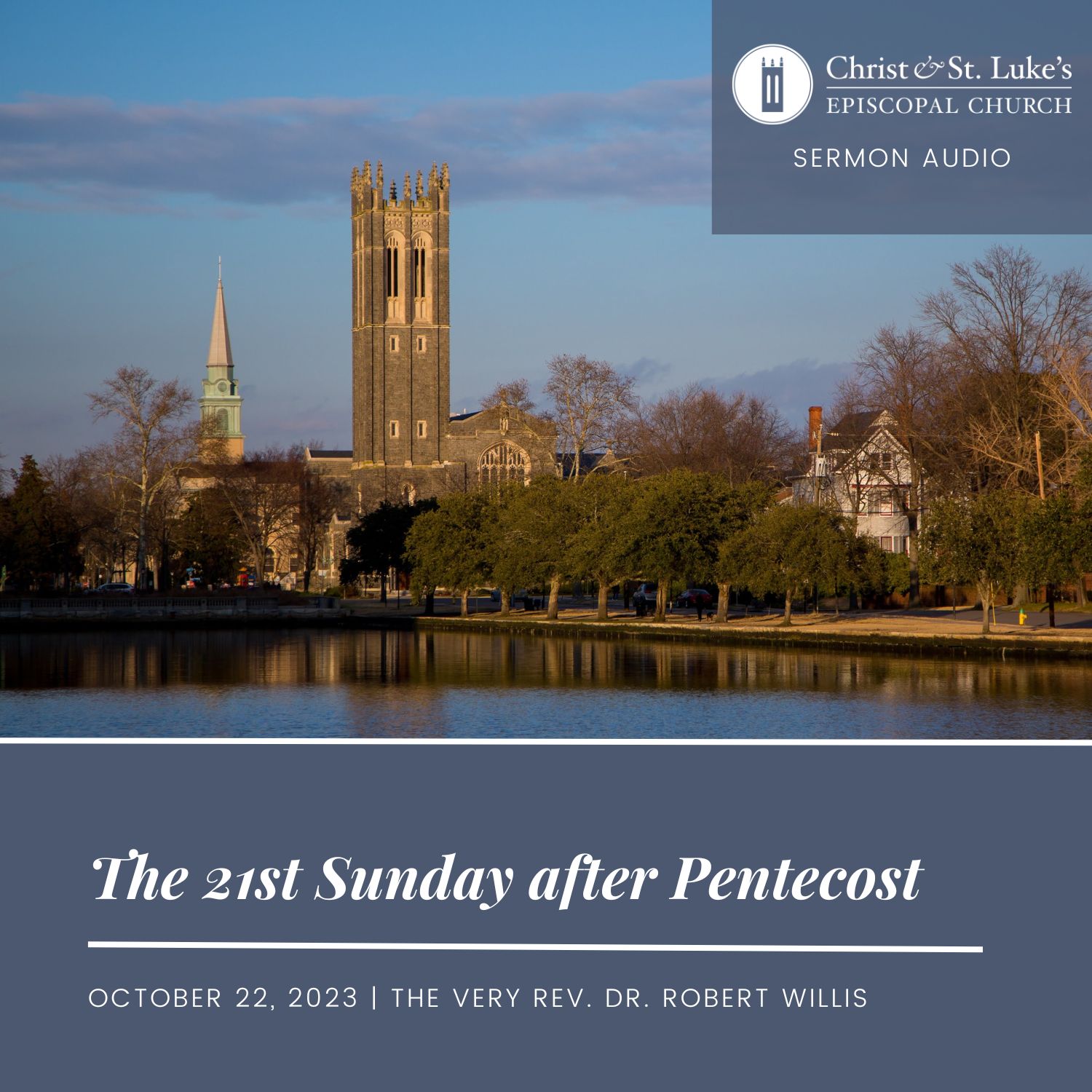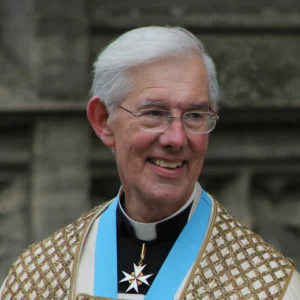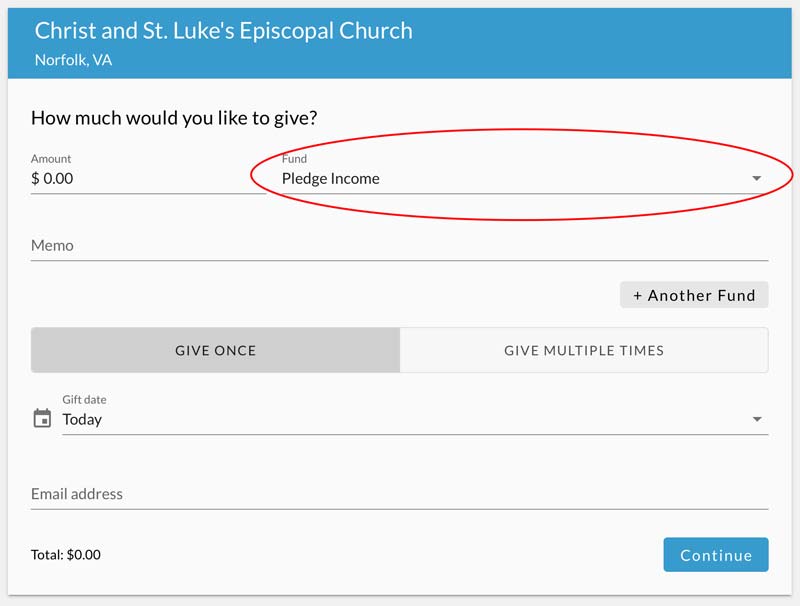Transcript
In the Name of the Father and of the Son and of the Holy Spirit, amen.
I want to begin by saying thank you for your really warm welcome with pleasure. And I’ve enjoyed the last three days immensely, and got to know so many of you. So it’s, it’s lovely to be able to stand here, as part of this musical foundation and the congregation of Christ & St. Luke’s here.
It always makes me excited when I hear the first chapter of the first letter to the Thessalonians read. It’s the earliest Christian document. And earlier than the other writings in the New Testament. It was written in all probability in about 50AD, and maybe even earlier than that. And that is much earlier than any of the Gospels being put together, though those stories obviously circulated separately, and each evangelist would have collected them. But here is St. Paul, writing a letter. And he’s writing it less than 20 years after the crucifixion of our Lord Jesus Christ. Easily within the living memory of all, though there’s no record of Paul himself ever having met Jesus, though, this letter, this wonderful letter to the Thessalonians, is his earliest attempt at setting out his theology of what it means to be a Christian. And it’s full of little hints about how that will go on.
Now, I’m conscious that we’re meeting here this morning, only days after the feast of St. Luke. And this church bears the Feast of the name of St. Luke together with the name of Christ. What a wonderful dual dedication. St. Luke, in some way, the most colorful and the most compassionate of the Gospels. St. Luke, the beloved physician, as Paul calls him. And it’s a great tradition that he was also an artist. Well, I don’t know whether he ever he painted with a brush. But certainly he could paint with words, for the way in which he explains the story of Jesus, particularly in the first two chapters, where would we be at Christmas time without the Gospel of St. Luke? And let me ask the choir where we would, where would we be, as far as canticles and glorious occur without the words of the Gospel of St. Luke?
It was a wonderful thing to us when we started the garden congregation and began each morning to just say morning prayer online from the deanery garden, that being Anglican Episcopalians, we decided we would read exactly what the lectionary is set out for each morning, just the New Testament lesson. And those of you who joined in that early back or have tuned in since to those early ones realized we were given an absolute treat. Because the whole of that summer took us through the whole of the Gospel of St. Luke, beginning of chapter one, and then the whole of the Acts of the Apostles. And I think we were in October, before we stopped reading Luke, his double volume. And we give great thanks for that. But we well know that Luke himself never met our Lord Jesus Christ physically, for Luke came from the Gentile world and followed St. Paul at a particular time and we look at the Acts of the Apostles and say, Oh, no, Luke has joined the story.
That gives you some wondrous sense of this church building with its dedication. But One Thessalonians we can learn from the Acts of the Apostles, seems to have been written by St. Paul, in Corinth. In his visit to Corinth he had left Thessalonica and then Timothy is names of the early church. Timothy arrived with news of the Thessalonians, and St. Paul sets about writing a letter.
It’s a very different worked out theology; it’s in its infancy, but it’s full of freshness. And if you’re clever, you can spot the seeds of the first Epistle to the Corinthians as well.
Look at that sentence: “We always give thanks to God for all of you, and mention you in our prayers. constantly remembering before our God and Father, your work of faith, and labor of love, and steadfastness of hope, in our Lord.” Remind you of anything? “And now abideth, these three: faith, hope, and love. But the greatest of these is love.” His first letter to the Corinthians, in the middle of that Greek world where he was, and Thessalonica also was in ancient Greece, surrounded by idols. And at the same time wondering about the, shall we say, questionable morality, of what he found going on around him. As someone who had been brought up as a strict Pharisee he must have been still in shock. But for Luke, it was something that was regular, he was the doctor. He had compassion on all sorts and conditions of humanity but gave himself up to a healing of a different kind.
But here is Paul, setting out for the Thessalonians, what is necessary. And that comes down through 2000 years, and it’s the simplest of messages, even for us here today in this church of Christ & St. Luke. We always give thanks to God for all of you–that will be our story, Fletcher, about remembering back at this congregation and how we were received–and mentioned you in our prayers, constantly remembering before our God, and Father, your work of faith, and labor of love, and steadfastness of hope in the Lord.
What a great testament of any Christian community and the Christian church when that was written in its total infancy, all the complications of doctrine and hierarchy and everything else absent. It was as fresh as a daisy. And here’s this chapter of Thessalonians just coming with the same freshness to us this morning.
And then the gospel. My word, what a gospel. After Matthew has given us–because it’s Matthew’s year, so we’ve been going on and on through Matthew through the weeks of this year–And we’ve been in the temple courtyard for a long time. Sunday by Sunday, we’ve seen how different political parties have tried to trap Jesus in the things that he was saying. And Jesus quietly answered them. And this morning is a different group. It’s not the Sadducees. It’s not the sort of elite rulers of the temple. It’s actually as we read the Pharisees, the party to which St. Paul had belonged when he was being educated in the feet of Gamaliel, the great scholar, and also the Herodians, supporters of the royal family, which had been put down and replaced by Pontius Pilate, the Roman procurator. The Romans were unpopular. But nevertheless they kept the peace. And here is a group of Pharisees coming up to try and trap Jesus saying, and they’re sitting on the people’s, resting on the people’s on unpopularity with the Romans and vice versa. We want to know whether it’s lawful to give taxes to the emperor or not. And Jesus in the middle of teaching again, we’ve had this for several weeks now with with his parables being given uninterrupted so that his clear stream of teaching to the people is interfered with by people with malice in their hearts. “Tell us what you think. Is it lawful to pay taxes to the emperor or not?” Whatever way he answers, it’s going to land him in trouble in one way or another. And he says, “Show me a coin used for the tax. To whom does it belong?” There’s no doubt about that the head of the emperor is stamped on the back. As in England, still, the head of the monarch is stamped on the back of coins.
And they give him the denarius. And he says, “So, let me ask you a question. Whose head is this? Whose title is this? To whom does the coin belong?” And the answer is, “Well, it’s the Emperor’s.” And then he says, “Well, give the Emperor what belongs to the Emperor. Give God what belongs to God.”
The answer, of course, is the whole of this wonderful creation. The planets in their courses, the sun, the moon, the stars, the deepest parts of unquantifiable space, too glorious for us even to contemplate rather like the the glory of God passing Moses on the mountain, and he shields his eyes from it. All of that belongs to God. So give to God what belongs to God. I suppose it could say, “Hand this planet back in a much better state than you received it.” We’re going in the other direction at the moment. But all that wonder, all that beauty, speaking of the Creator’s hand.
It is the simplest and cleverest of answers. And it actually poses a problem for us, because Jesus will never let you off the hook of making decisions about your own life. It has to happen every day. And it has to be informed by prayer. And it’s best done with a community of people praying with you. And there’s no better community than the one that I’ve got the best of you all this morning: full of music, full of prayer, and full of knowledge of each other, and love and faith and hope. And in the midst of that, you make community decisions, perhaps a good thing to say in a time when stewardship is on the agenda, and you’re being asked to commit yourself to the life of this church. But at the same time, what belongs in your duty to the state which looks after you? Jesus doesn’t let you off that hook. He gives you that to think out in conscience in prayer and in the context of worship by yourself.
And then one goes back, after “give to God the things that are God’s,” to those gifts he gives to us. Faith and love, and hope and the beauty and glory of all creation. Compare that with a silver coin bearing the head of an earthly emperor of finite years. See how Jesus weighs the one against the other and sets it right in your heart and mind and physical capacity and says, each of us has particular creative gifts, and we are never, never nearer to God than when we are being creative. But every one of us will be creative in different ways. And our respect for another’s creativity is really a capacity to love that person and encourage them and receive the same encouragement in return.
All so simple in Thessalonians and about to get gradually built over and over and over through the years with the complications of church structure–very necessary when the communities grow very large. How we deal with leadership, how we deal with all sorts of things. St. Paul’s letters are going to grow bigger and bigger and bigger. And you get through all kinds of chapters where you think, “Well, it’s not like that now.” No, it isn’t. So you have to make your own decisions about what it’s like now what the world needs, what your duty to those who are trying to be leaders in that world is and then what your duty to God is which surmounts everything.
That’s not easy for any of us. We have to help one another in it. And as we do so, we know that we are hearing the voice of Jesus in his humanity, pointing towards thanksgiving for his divinity. And the great gift that God has given this earth of the life of Jesus of Nazareth, the one whom St. John, in a much later gospel calls the Word, “in the beginning was the Word,” but here the simplicity of that sentence stays with us. And we could say to one another, “We always give thanks to God for all of you and mention you daily in our press, constantly remembering before our God and Father, your work of faith and labor of love and steadfastness of hope in our Lord Jesus Christ.
Thank God we say, after two days with you, and now this day also, for the Community of Christ & St. Luke’s, for all those things are found here. And there are difficult roads and difficult decisions. And there’s the support of the clergy and the choir and all of those things that are utterly necessary. But in the middle of this clear, simple stream, coming from the absolute beginnings of those who grasped what the gospel meant, and now it’s our holy duty to take on that burden, and our pilgrim path at all stages of our life, even when the body has to give over to mind and simply think, remember, and be wise. And then the Spirit flowers.
Thank God for this community. But thank God also, that this precious little snippet from 2000 years ago, shows us how it was in the beginning and what it would develop into a little spring into a great river.
Let it be so here and God bless you all on this Sunday morning. Amen.



